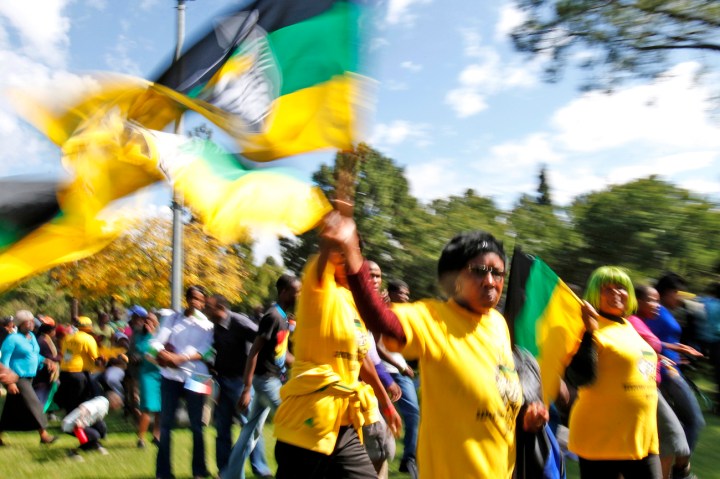Politics, South Africa
2012: The year of Congresses, aka The Year of Paralysis

It is not turning out to be a good year for the ANC. What should have been a year-long celebration of its 100-year existence is in fact a 12-month brawl over leadership positions in the three alliance formations. Factional battles are so consuming the party’s grand plans to strengthen and renew itself that no one even notices the centenary torch crossing the country. By RANJENI MUNUSAMY.
Not many people will remember what President Jacob Zuma read out in this year’s ANC January 8th statement. It was an excruciatingly tedious drone, which went on for hours, detailing the 100-year history of the ANC. By the time he got to the ANC’s agenda for 2012, most people at the stadium had left, and those watching on television had changed the channel.
The ANC NEC had compiled an elaborate agenda for its centenary year, which would, presumably, culminate in a grand show of unity at the party’s 53rd national conference in Mangaung in December.
According to Zuma, the ANC required “new organisational capacities and strategic capabilities to give political, moral and intellectual leadership and serve our nation in all the five pillars of social transformation” (those left in the stadium were polite enough not to laugh at this point).
Therefore, “urgent and practical steps” were to be taken this year to:
- revitalise the grassroots structures of the movement
- place the ANC at the forefront of the progressive forces for change
- fast-track the development of cadres – new and old
- ensure that our programme of transforming our country is accelerated and taken to new heights
- restore the core values, stamp out factionalism and promote political discipline
- place education and skills development at the centre of our transformation and development agenda
- deepen our contribution to the renewal of the African continent and the progressive forces in the world
- professionalise and modernise the operations of the ANC.
It is not going well.
Five months into 2012 and not a single “practical step” towards achieving any of these goals is evident. It could be that ANC structures are not really aware that this is the organisation’s agenda for the year. Or it could be as a result of what Cosatu general secretary Zwelinzima Vavi calls “congress fever”, which is consuming the ANC and the tripartite alliance in toxic leadership battles.
All three of the alliance partners, the ANC, the SACP and Cosatu, have the misfortune of having elective conferences this year and, because of the crossover in membership, each event has implications for the other organisations. Each of the congresses would have been action-packed on their own. All within the space of six months is turning out to be a travelling circus.
2012 should have been a year when the nation united to celebrate the 100th anniversary of the party which, through relentless struggle and exceptional leadership, brought democracy and freedom to South Africa. It should have been a time when, across racial and political divides, the country paused to salute the ANC’s proud history.
Instead, the national agenda is hijacked by ANC infighting linked to the ANC succession battle. If leadership contestation in ANC conferences prior to the Polokwane meeting was fierce, it was still possible to get people to work together afterwards in the interests of the organisation.
However, various factions, now prevalent in all formations of the alliance, are engaged in a fight to the death – determined to have access to power and resources at all costs and to drive those in opposing factions out of the ANC.
As was the case at Polokwane, state security agencies are again caught up in these battles, implanting sinister activities into what should be healthy democratic contestation.
Vavi told the Sunday Times this week that “congress fever” was causing insecure leaders in the three formations to be overly sensitive to criticism and accuse each other of plots and counter-plots.
“It is a difficult year… congresses are not an easy matter. 2012 will be a year of increased tensions, because everybody fears [they] may not be re-elected… it makes things a little bit dicey. When you talk about the general weaknesses of anybody, you can easily be seen to be campaigning and de-campaigning,” he said.
And it is difficult to keep the lid on leadership battles when regions and provinces of all the ANC and SACP and affiliate unions of Cosatu are holding their conferences to prepare for the national meetings.
The SACP leadership core is trying to convince its structures that it can manage the party while most of its senior leaders straddle positions in government. The party has effectively disappeared off the national radar since its leaders went to government, but those leaders want the party’s July congress to endorse a neat rearrangement of their leadership so they can keep their senior positions while other people effectively do the spadework.
Cosatu’s 23 affiliate unions each have their own areas of interest, depending on which areas of the economy their members occupy. But other than the Cosatu-led conversation about e-tolling and labour brokers, there is no indication that there is dynamic debate in individual unions on issues affecting the economy.
The ANC’s succession battle has now splintered the powerful trade union federation. The affiliates have coalesced into three broad groups – those pushing for leadership change in the ANC, those keen to retain the status quo and those who are still undecided. Cosatu’s last central executive committee decided to stay out of the ANC leadership battle for as long as possible, but as the opposing National Union of Mineworkers and National Union of Metalworkers of SA go to their respective congresses in the next few weeks, this situation might change.
If there is discussion on important policy issues coming out of ANC provincial conferences – and it should be on everyone’s minds considering the ANC’s policy conference is in June – it is not taking precedence.
The ANC has circulated 12 policy documents on issues such as economic transformation, mining, state-owned enterprises, social transformation and international relations. With just a few weeks to go to the policy conference, there is virtually no debate in the public domain on any of these issues. The ANC has failed to get its structures and society engaged on these crucial issues, which will determine the policy trajectory of the country for the next five years. It is a serious indictment on the ruling party.
Although the ANC has effectively banned succession talk until October, its regional and provincial structures continue to discuss preferred candidates. The SACP and Cosatu congresses will create further momentum for what is expected to be an unpredictable showdown at Manguang.
At the ANC’s 50th national conference in Mafikeng in 1997, it mercifully changed the practice of having national conferences from every three years to every five years, giving its members time to come up for air between leadership contests. Therefore we now have the façade of unity in the ANC and alliance while they are on the campaign trail for national and local government elections, and deadly internal battles in the run-up to their own elective conferences.
After the Polokwane conference, the victorious Zuma faction was riding so high that it did not consider the long-term implications of arbitrarily cutting short Thabo Mbeki’s presidency as an act of revenge. The formation of the Congress of the People also set a bad precedent when the losing faction would not accept defeat and thought it could also exact revenge for its loss through a breakaway.
Because the situation is now so fractured in the ANC and factions are not clear-cut, it is difficult to predict how the winners and losers would react to the Mangaung outcome.
One thing is certain, whoever delivers next year’s January 8 statement will hold everyone’s attention – if only for a little while. DM
Photo by Reuters.






 Become an Insider
Become an Insider